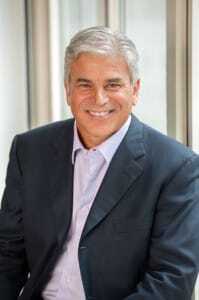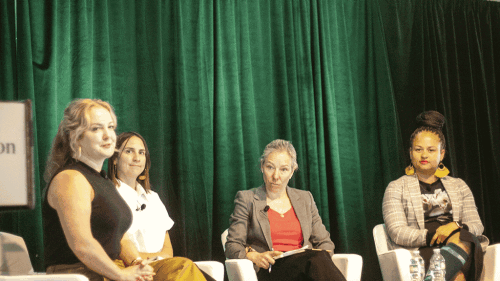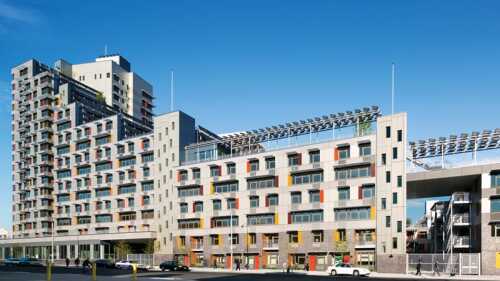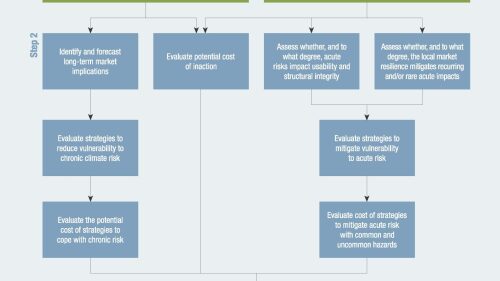On October 20, the ULI Foundation will honor ULI Foundation Governor Michael D. Fascitelli for his contributions to the Institute and his career accomplishments in real estate finance and responsible land use. The gala, on the eve of the 2014 ULI Fall Meeting in New York City, will be held at the American Museum of Natural History overlooking Central Park.
The son of working-class Italian immigrants, 58-year-old Fascitelli credits his success to his comfort with multiple points of view: the no-nonsense outlook of his Great Depression–era parents and their neighborhood in Providence, Rhode Island; the intellectualism of the Ivy League; and Wall Street’s competitive, fast-paced atmosphere.
Fascitelli fulfilled his parents’ aspirations for him by graduating summa cum laude from the University of Rhode Island with a bachelor of science in industrial engineering and obtaining an MBA from Harvard Business School. After Harvard, he worked for management consulting firm McKinsey & Company and in 1985 was hired by investment banking firm Goldman Sachs. He rose to become a full partner and lead the company’s real estate investment practice, helping to establish Goldman’s Whitehall Funds. In 1996, he became president of Vornado Realty Trust, one of the largest office and retail real estate investment trusts (REITs) in the United States and was the company’s chief executive officer from 2009 until 2013. He currently serves on Vornado’s board of trustees.
Fascitelli joined ULI in 1985 and has participated on national and local product councils, served as a ULI board member, and was a ULI trustee from 1994 until June 2014. He has shared his expertise through ULI forums and panels and has been a resource to his peers and a mentor to the next generation. Fascitelli and his family recently pledged a $2 million planned gift to the legacy giving program of the ULI Foundation.
In August, Fascitelli sat for an interview with ULI senior fellow for finance Stephen R. Blank, who has a distinguished background in real estate finance, including leadership positions at Oppenheimer & Co.; Cushman & Wakefield; Kidder, Peabody & Co.; and Bache & Co.
Insights on Investing
It seems like the real estate industry is at an inflection point and that too many investors with too much money are chasing too few deals. If you are a seller these days, deals are said to be “priced to perfection.” If you are a buyer, it’s a little more difficult. What’s driving this seemingly insatiable desire to invest in commercial and multifamily real estate?
I think people are buying real estate for four or five reasons. The first is yield. They’re getting some current yield, which is scarce in this environment. Two, low interest rates, which are allowing them to lever the real estate and enhance the yield, even at [today’s] low cap rates. Third, alternatives aren’t as attractive, or are unknown. Fourth, people are just diversifying, parking money. And fifth, people in a low-return environment may be happy with single-digit rates of return, particularly if half of it is in cash flow. Now it seems a little heated, but on the other hand, I’ve said [that] for the past couple of years.
If you’re the investment manager, how are you dealing with this search for yield? Are we having strategy creep because their investors are pressing them to be more risk-on in searching for yield?
I think opportunistic investors are doing core-plus funds and the core-plus guys are doing value-added or opportunistic investments. And all those returns have come down 400 to 500 basis points. If you can get some leverage on it, it still may make sense. Sources of capital are blending into one another.
The other thing that’s driving this is the tremendous amount of capital liquidity in the world. People continue to allocate more to real estate and that’s driving things even higher.
What has to happen to value in today’s low-cap-rate world when we don’t have cap-rate compression and we start to come up against a couple of hundred billion [dollars] in refinancing each year if interest rates are up?
The real estate cash flows might beat interest rates rising. That’s the only logical thing. If rates are rising, you’re going to end up having higher financing costs and higher residual cap rates. You might end up with pretty marginal returns.
But hopefully it won’t be a disaster scenario where there is value destruction. It may just be value maintenance!
I guess what we have to look for is that, hopefully, the rising tide lifts all ships. We’re [seeing] more and more people look at development as the price of existing properties is so high. Are they getting compensated correctly for the risk?
Well, not really. I think what’s happening [is that] people are saying everything else is too expensive, so I will develop. If they get a pro forma of 5.5 to 6 percent for apartments—even if that’s off 100 basis points or even more—they will end up [with] a new product at 4 or 4.5 percent. But it’s not the end of the world. People are rationalizing lower returns and taking more risk.
Investing in a low-return world is very difficult . . . people are groping for yield; 6 or 7 percent yield is looking pretty good right now.
Six or 7 percent is looking great right now. One trend we see is that the institutional investors seem to be looking for greater day-to-day operating control. More separate accounts and clubs. What’s causing them to become more active?
I think it was caused by the meltdown/debacle of 2008–09, when people found themselves in large funds, many of them in passive or noncontrolling positions, and they witnessed erratic behavior or results. They felt that “that’s not going to happen to me again . . . I can solve that by having more control, more influence.” It doesn’t mean they are operating the property; it does mean they have separate accounts where they vote, they have discretion, veto power, and/or they sit on advisory boards for funds with more rights.
We used to say we would make it on the buy side, we would buy well. Today, we say we have got to make it on the operations side.
People are saying [that] when they buy something, there will be operational improvement, value-added to give a higher return. Returns have gotten so low. People are looking for more operational, value-added returns in some way.
All of a sudden we have this thing called crowdfunding. It’s hard to tell if this is a trend or a train. You’ve seen all the different REITs through all the REIT cycles, the nontraded REITs. Is crowdfunding the next phenomenon?
It could be. In the old days, it was called the syndication business, modified and updated for technology and more-relaxed investment rules. It’s an attempt to make smaller increments, maybe appeal to a broader audience—maybe less sophisticated—and lower amount per unit investor. If they handle it right, the investors will be people who don’t ordinarily invest. What’s different is the ease of what they’re doing, making it more accessible, real-time and user-friendly.
It’s an old business [model] with a new, more polished platform. If you do it and the underwriting is good, then it’s okay. If there are abuses in it, it could blow up.
What’s Next?
As we are coming into the end of this economic cycle, where does Mike Fascitelli fit into all this?
I’m getting a little long in the tooth, and this is a tough market. [Laughs.] I made my career doing a lot of investing in good and bad times—not always at the perfect time. I had very good platforms to work with. I’ve got to decide if now is the right time to be investing, what sort of platform to do it with, or if I [should] go build something on my own.
What are some of the biggest leadership challenges you have faced?
One of the biggest challenges of the real estate business has been timing—and having the courage to invest when others don’t. Going back to my career at Goldman, we started to have a very bad market where we couldn’t [get] anything closed. We said, “Maybe it’s a good time to invest.” So we created Whitehall out of the bad market and the RTC [Resolution Trust Corporation, a government-owned asset management company that liquidated assets from insolvent savings and loan associations] days of the early ’90s. That was a huge challenge. Real estate values had gotten clobbered; it looked like there was unlimited supply of space that would take years to absorb.
Everybody tends to overstate the current conditions. One of the challenges is to look beyond the current conditions. It’s very tough to do. We did that really well at Whitehall, we did it well at Vornado, where we bought when things were relatively depressed and underpriced then had the courage to get out of the market, to stop buying when this kind of cycle gets long in the tooth.
One of the challenges was just timing; and a second challenge was in the acquisition area. People wanted to acquire, they wanted to do deals. But just saying no was a really hard challenge. One of the things we did really well at Vornado was allocating capital. For the most part, [we allocated] bigger amounts of capital when things were a little tougher to invest in and [pulled] back when things were getting frothy.
But you never know, right? Because you can’t predict the future. You can know these things only in hindsight. You can never time it perfectly. You have to have enough conviction. And you have to lead [and say], “This is where we’re going, this is why we’re doing it, or not doing it,” so the organization doesn’t shut down, lose confidence, or get scared. The right amount of fear and paranoia has to always be there. That’s a tough balance to keep.
Where do you see your career going? Are you taking a break?
Yeah. I went full out for over 30 years. I was a kid from an immigrant Italian family with nothing. I started working as a kid. I did construction, landscaping, paper routes, shingling roofs. I’ve been working my whole life. Undergraduate school, business school at Harvard . . . then I worked at McKinsey, Goldman, and Vornado. Those are like going from the frying pan to the broiler. All of them are incredibly intense, 24/7 jobs.
I felt like I’d done a lot of good things—not all perfectly, made some mistakes. For the most part, I had a better batting average than most. I needed a break, to rejuvenate myself. On the other hand, I’m not very good at relaxing and I want to get back to work. All I’ve known my whole life is working very hard.
I ended up doing a few deals, built a small organization. It’s been little over a year since I resigned [from Vornado]. I’ve gotten organized so I can be in the game, but not necessarily go all-in by raising a fund. I’d like to come back in a more meaningful way, full-time. I just haven’t figured out exactly when and how.
Are you able to spend more time developing your personal interests, time with your family?
My sons are 21, 20, and 17, so they don’t want to spend all their waking time with me. They have their own lives, their own interests, and school obligations. But I have been able to spend a little more time with them. I’m interested in wine, and I’ve gotten back into physical shape and my golf game back. It’s been hard [to slow down] when you’ve been going 24/7, but it feels great having less pressure.I’m finally getting into the rhythm of what I want. It’s a difficult market, so I don’t want to go rushing in. I’ll know the right opportunity when it comes my way.
How did being the son of immigrants shape your career?
My mother was a Depression baby, the oldest of ten in the family. My father was eldest of six. They weren’t educated people, but they were hard-working people. [Also,] my brother is 75 and I’m 58—there’s 17-and-a-half-year difference [between us], with nobody in between. In medical terms, they call that a “change-of-life baby”; in real terms, they call that an “accident.” They instilled in me a sense of hard work, a sense of family, and drive. Our family had no money. I never felt poor growing up. I didn’t feel like I didn’t have clothes or food—my mother was Italian, we had plenty of food. There was a drive for me to be successful, make money, and create options that [my parents] never had. They never went to high school. My mother said, “Get educated, get better opportunities.” She was the most selfless person I’ve ever known, and encouraged me to give back. Things worked out far better than anyone could’ve possibly ever imagined—[including] me!
I did really well at University of Rhode Island, Harvard, at McKinsey, Goldman, Vornado. One of the things I’m most proud of is that I truly respected and got along with all kinds of people. I was good at negotiating, recruiting, and mentoring.
I came from a background where I had a pretty good touch with the common person. I was also in touch with the driving, killer-intellectual kind of person. I could navigate both ends of that successfully. That was a gift of my parents and my background as a kid growing up.
One of my professors [at Harvard Business School] told me, “These guys are no smarter than you. You just have to have more confidence that they’re not [smarter] than you. You’re the most street-smart and commercially minded of anyone in the class.” Many of these things in real estate are just about judgment and your gut. You have to do the analytic work and the math, but you also have to have judgment, which is honed with experience. That helped me differentiate [myself] in my career.
Can you share some thoughts on what ULI has meant to your career?
I remember going to my first ULI meeting, and it felt overwhelming. I was a rookie just starting out. It was almost 30 years ago and I was starting my career at Goldman.
ULI is an organization where you can start to network and meet people. I found that a lot of the people were incredibly helpful, reached out to me, and asked, “What can I do to help you?” I went to a product council, which allowed me to participate in a small group that felt less intimidating.
Ultimately, ULI was a great platform for me to meet a lot of people. At Goldman, I was dealing with a national clientele. Those contacts I met at ULI became people who helped me or whom I helped. Eventually, they became people we did business with. It was a good forum to learn and network. Eventually for me, as I became more successful, it became a good forum for giving back.
As I’ve become a pretty good reader of markets, I’ve shared that knowledge with others. And I’ve gotten so much out of serving on ULI panels, forums, product councils, and conferences.
In ULI, one of the advantages is its size and breadth; one of its disadvantages is its size and breadth. You have to get into Young Leaders, product councils, District Councils, trustees, or smaller groups that are more manageable, so you can have an impact, to get something out of it or to give something back. That’s what I tell young people.
Look, it’s great if you can get an older or senior mentor. [It helps to find an] identity. People are unbelievably supportive and unbelievably giving if you put yourself in that situation.
You are being honored by the ULI Foundation. Why do you believe it’s important for members to support the Foundation?
One of the challenges in ULI is that it’s not perceived as a philanthropic organization, but more as an industry trade group. It’s not people’s number one, two, or three charity, like their hospital, school, or church. It’s hard to get people engaged philanthropically with ULI until they get a sense of its inner workings. Like a university or a nonprofit organization, it educates and does outreach around issues critical to society.
To realize its full potential, ULI needs to rely on more private funding and individual philanthropy rather than just conference attendance or membership dues. If you have been successful, it’s incumbent upon you to give back. That’s why we felt we should make a gift that would allow ULI to conduct research on topics that help communities thrive and become sustainable. People who have done well in their careers have to give back to make that happen. UL
Archana Pyati, ULI impact writer, participated in the interview, which has been edited for length and clarity.





